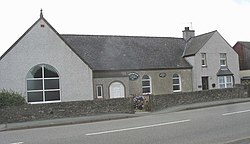| Rhostrehwfa | |
|---|---|
 | |
Location within Anglesey | |
| Principal area | |
| Preserved county | |
| Country | Wales |
| Sovereign state | United Kingdom |
| Post town | LLANGEFNI |
| Postcode district | LL77 |
| Police | North Wales |
| Fire | North Wales |
| Ambulance | Welsh |
Rhostrehwfa is a village in southern-central Anglesey, located southwest of Llangefni. To the southeast is the Malltraeth Marsh. It is situated at a prominent point on the crest of a ridge overlooking the River Cefni valley to the south. [1] It contains the Capel Pisgah and several holiday cottages. It is in the community of Llangristiolus and the Bodffordd electoral ward.


